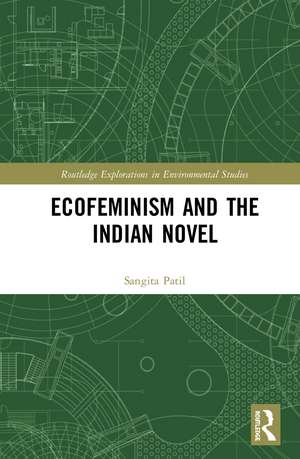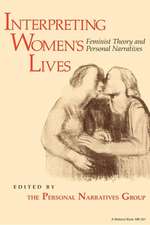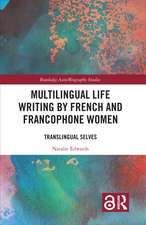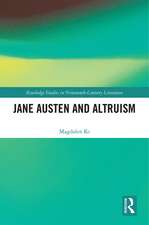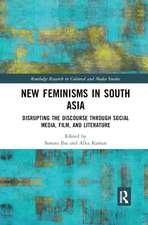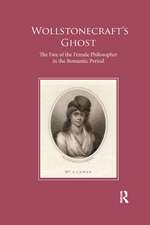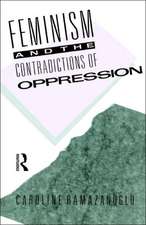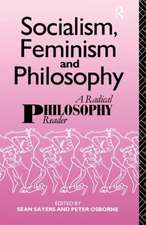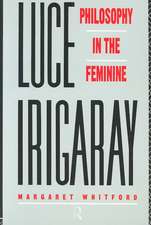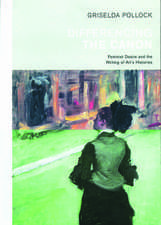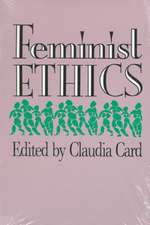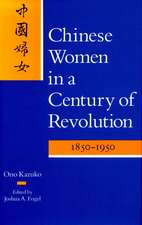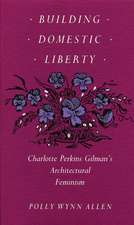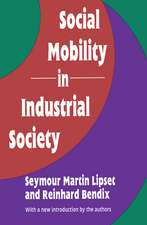Ecofeminism and the Indian Novel: Routledge Explorations in Environmental Studies
Autor Sangita Patilen Limba Engleză Hardback – 25 iul 2019
In examining a selection of novels, the author argues that Indian texts conceptualize the ecological crisis more as a human problem than as a gender problem. The book proposes that we should think of ecofeminism as ecohumanism instead, seeing human beings and nature as a part of a complex web. Novels analysed within the text include Kamala Markandaya’s Nectar in a Sieve (1954), Shivram Karanth’s Return to Earth (2002) and Na D’Souza’s Dweepa (2013).
Ecofeminism and the Indian Novel will be of great interest to students and scholars of ecofeminism, ecocriticism, ecological feminism, environmental humanities, gender studies, ecological humanities, feminist studies and Indian literature.
| Toate formatele și edițiile | Preț | Express |
|---|---|---|
| Paperback (1) | 309.12 lei 3-5 săpt. | +14.28 lei 4-10 zile |
| Taylor & Francis – 30 iun 2021 | 309.12 lei 3-5 săpt. | +14.28 lei 4-10 zile |
| Hardback (1) | 764.20 lei 6-8 săpt. | |
| Taylor & Francis – 25 iul 2019 | 764.20 lei 6-8 săpt. |
Din seria Routledge Explorations in Environmental Studies
-
 Preț: 281.77 lei
Preț: 281.77 lei -
 Preț: 243.62 lei
Preț: 243.62 lei -
 Preț: 288.87 lei
Preț: 288.87 lei -
 Preț: 294.72 lei
Preț: 294.72 lei -
 Preț: 326.82 lei
Preț: 326.82 lei -
 Preț: 310.88 lei
Preț: 310.88 lei -
 Preț: 310.29 lei
Preț: 310.29 lei -
 Preț: 326.49 lei
Preț: 326.49 lei -
 Preț: 311.41 lei
Preț: 311.41 lei -
 Preț: 311.41 lei
Preț: 311.41 lei -
 Preț: 279.47 lei
Preț: 279.47 lei -
 Preț: 309.12 lei
Preț: 309.12 lei -
 Preț: 378.44 lei
Preț: 378.44 lei -
 Preț: 416.22 lei
Preț: 416.22 lei -
 Preț: 444.62 lei
Preț: 444.62 lei - 42%
 Preț: 234.90 lei
Preț: 234.90 lei -
 Preț: 480.62 lei
Preț: 480.62 lei - 12%
 Preț: 325.34 lei
Preț: 325.34 lei -
 Preț: 443.65 lei
Preț: 443.65 lei - 18%
 Preț: 1056.28 lei
Preț: 1056.28 lei -
 Preț: 442.50 lei
Preț: 442.50 lei -
 Preț: 461.50 lei
Preț: 461.50 lei -
 Preț: 421.63 lei
Preț: 421.63 lei -
 Preț: 449.41 lei
Preț: 449.41 lei - 18%
 Preț: 1060.52 lei
Preț: 1060.52 lei - 18%
 Preț: 1109.99 lei
Preț: 1109.99 lei - 25%
 Preț: 852.63 lei
Preț: 852.63 lei -
 Preț: 389.38 lei
Preț: 389.38 lei - 18%
 Preț: 699.21 lei
Preț: 699.21 lei - 15%
 Preț: 418.51 lei
Preț: 418.51 lei -
 Preț: 416.22 lei
Preț: 416.22 lei -
 Preț: 407.57 lei
Preț: 407.57 lei - 18%
 Preț: 1056.28 lei
Preț: 1056.28 lei - 26%
 Preț: 846.09 lei
Preț: 846.09 lei -
 Preț: 438.30 lei
Preț: 438.30 lei - 15%
 Preț: 423.09 lei
Preț: 423.09 lei -
 Preț: 448.44 lei
Preț: 448.44 lei - 13%
 Preț: 296.95 lei
Preț: 296.95 lei - 18%
 Preț: 1167.71 lei
Preț: 1167.71 lei - 16%
 Preț: 65.03 lei
Preț: 65.03 lei - 25%
 Preț: 767.88 lei
Preț: 767.88 lei
Preț: 764.20 lei
Preț vechi: 1027.40 lei
-26% Nou
Puncte Express: 1146
Preț estimativ în valută:
146.23€ • 153.06$ • 121.71£
146.23€ • 153.06$ • 121.71£
Carte tipărită la comandă
Livrare economică 31 martie-14 aprilie
Preluare comenzi: 021 569.72.76
Specificații
ISBN-13: 9780367198336
ISBN-10: 0367198339
Pagini: 160
Dimensiuni: 156 x 234 x 10 mm
Greutate: 0.45 kg
Ediția:1
Editura: Taylor & Francis
Colecția Routledge
Seria Routledge Explorations in Environmental Studies
Locul publicării:Oxford, United Kingdom
ISBN-10: 0367198339
Pagini: 160
Dimensiuni: 156 x 234 x 10 mm
Greutate: 0.45 kg
Ediția:1
Editura: Taylor & Francis
Colecția Routledge
Seria Routledge Explorations in Environmental Studies
Locul publicării:Oxford, United Kingdom
Public țintă
PostgraduateCuprins
Introduction: Ecofeminism and the Indian Novel
Introduction
Ecofeminism: Environmental Studies and Feminism
Ecofeminism: Indian Polemical Discourse
Indian Novel
1 An Interface between Human Beings and Nature
1.1 Introduction
1.2 The Genealogy of Ecofeminism
1.3 Indian Polemical Discourse: Environment and Ecofeminism
1.4 The Genealogy of Indian Novel
1.5 The Discursive Formation of the Environment in Indian Novel
1.6 Rumination on Indian Environment Movements and Protest
1.7 Conclusion: The Formulation of Framework
2 Agriculture as an Ecofeminist Concern: Nectar in a Sieve, The Upheaval, Return to Earth
and Gift in Green
2.1 Introduction
2.2 Nectar in a Sieve: The Impact of Tannery on Pastoral Life
2.3 The Upheaval: The Impact of Mining on Farming Community
2.4 Shivram Karanth’s Return to Earth: The Impact of Modernization on Agrarian Culture
2.5 Sarah Joseph’s Gift in Green: A Toxic Discourse
3 Dam Construction and Ecological Crisis: The Coffer Dams and Dweepa
3.1 Introduction
3.2 The Project of Dam Construction and Ecological Crisis in India
3.3 Kamala Markandaya’s The Coffer Dams: Modern Juggernaut
3.4 Na D’ Souza’s Dweepa: An Island of Destruction
4 The Industrial Disaster: Animal’s People
4.1 Introduction
4.2 The Bhopal Gas Tragedy: A Backdrop
4.3 Patriarchal Developmental Attitude: Industrial Disaster
4.4 Women as Victim of the Industrial Disaster
4.5 Rhetorical Tropes
4.6 The Uniqueness of Animal’s People as an Ecohumanist Narrative
5 Animals as Absent Referents: The Man from Chinnamasta
5.1 Introduction
5.2 The Mythological Background
5.3 The Ethnography of Animal Sacrifice
5.4 Patriarchy and Animal Sacrifice
5.5 Women’s Concern for Animals
5.6 The Uniqueness of The Man from Chinnamasta as an Ecofeminist Narrative
6 Reconceptualizing Ecofeminism: From Ecofeminism to Ecohumanism
6.1 Introduction
6.2 An Overview of the Ecofeminist Concern
6.3 Reconceptualizing Ecofeminism: From Feminism to Humanism
6.4 Conceptual Framework
Introduction
Ecofeminism: Environmental Studies and Feminism
Ecofeminism: Indian Polemical Discourse
Indian Novel
1 An Interface between Human Beings and Nature
1.1 Introduction
1.2 The Genealogy of Ecofeminism
1.3 Indian Polemical Discourse: Environment and Ecofeminism
1.4 The Genealogy of Indian Novel
1.5 The Discursive Formation of the Environment in Indian Novel
1.6 Rumination on Indian Environment Movements and Protest
1.7 Conclusion: The Formulation of Framework
2 Agriculture as an Ecofeminist Concern: Nectar in a Sieve, The Upheaval, Return to Earth
and Gift in Green
2.1 Introduction
2.2 Nectar in a Sieve: The Impact of Tannery on Pastoral Life
2.3 The Upheaval: The Impact of Mining on Farming Community
2.4 Shivram Karanth’s Return to Earth: The Impact of Modernization on Agrarian Culture
2.5 Sarah Joseph’s Gift in Green: A Toxic Discourse
3 Dam Construction and Ecological Crisis: The Coffer Dams and Dweepa
3.1 Introduction
3.2 The Project of Dam Construction and Ecological Crisis in India
3.3 Kamala Markandaya’s The Coffer Dams: Modern Juggernaut
3.4 Na D’ Souza’s Dweepa: An Island of Destruction
4 The Industrial Disaster: Animal’s People
4.1 Introduction
4.2 The Bhopal Gas Tragedy: A Backdrop
4.3 Patriarchal Developmental Attitude: Industrial Disaster
4.4 Women as Victim of the Industrial Disaster
4.5 Rhetorical Tropes
4.6 The Uniqueness of Animal’s People as an Ecohumanist Narrative
5 Animals as Absent Referents: The Man from Chinnamasta
5.1 Introduction
5.2 The Mythological Background
5.3 The Ethnography of Animal Sacrifice
5.4 Patriarchy and Animal Sacrifice
5.5 Women’s Concern for Animals
5.6 The Uniqueness of The Man from Chinnamasta as an Ecofeminist Narrative
6 Reconceptualizing Ecofeminism: From Ecofeminism to Ecohumanism
6.1 Introduction
6.2 An Overview of the Ecofeminist Concern
6.3 Reconceptualizing Ecofeminism: From Feminism to Humanism
6.4 Conceptual Framework
Notă biografică
Dr Sangita Patil is an Assistant Professor at LBS Govt First Grade College, Bengaluru, India. Her research interests include Ecofeminism, Literary Theory, Cultural Studies and Liberal Education.
Descriere
Ecofeminism and the Indian Novel tests the theories of ecofeminism against the background of India’s often different perceptions of environmental problems, challenging the hegemony of Western culture in thinking about human problems.
